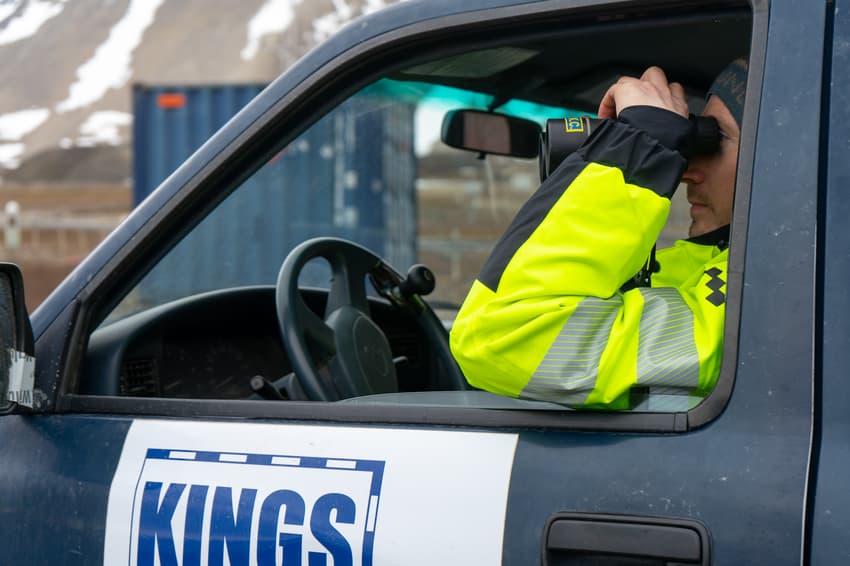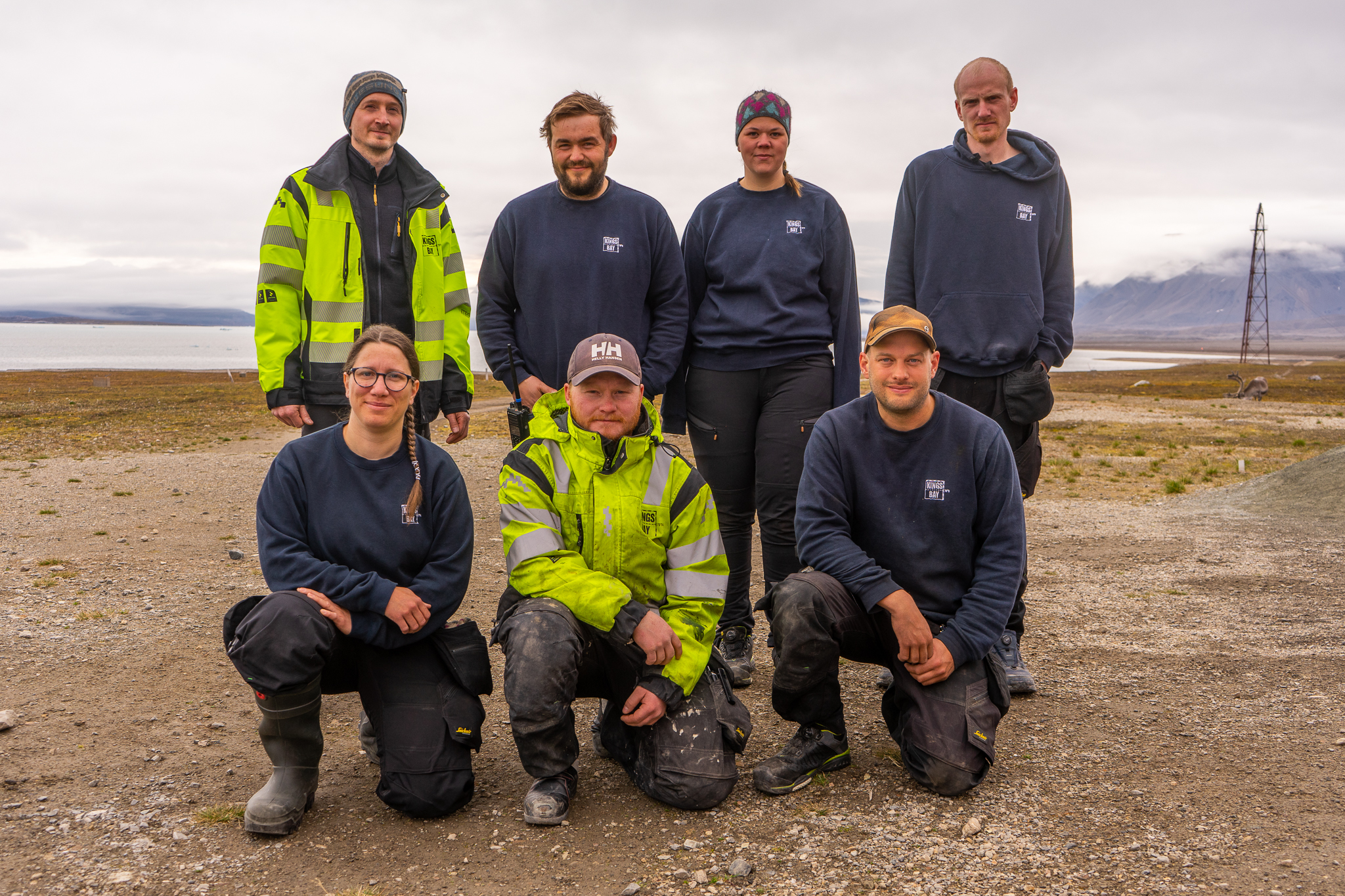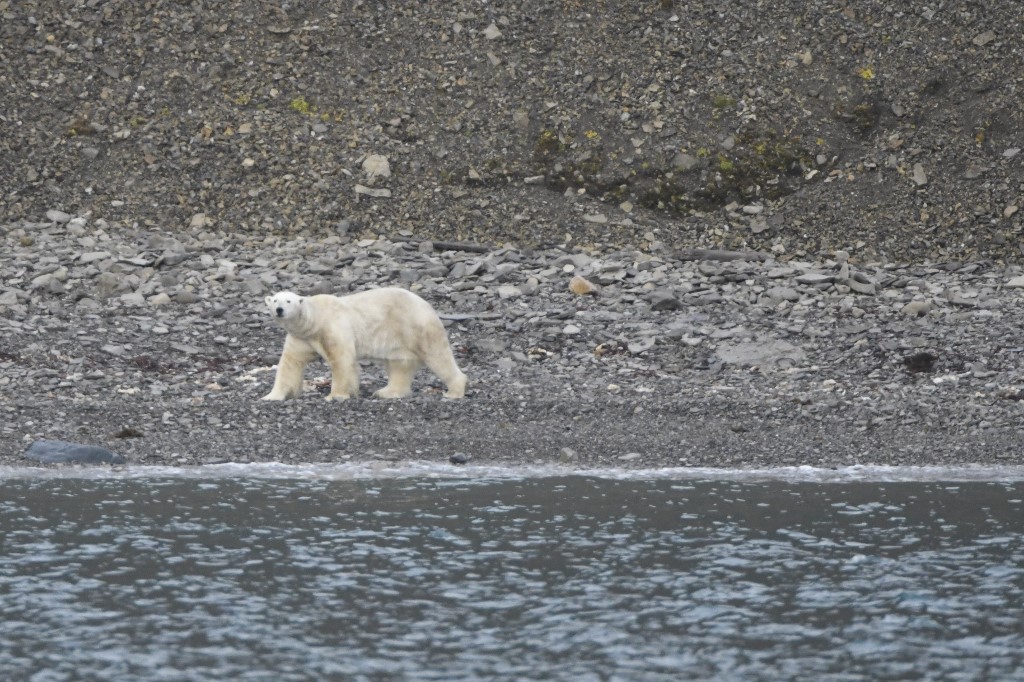Life as a polar bear ranger in the Norwegian Arctic

On the Norwegian Arctic archipelago of Svalbard, a dedicated team marshals the local polar bear population. The Local spoke to the Kings Bay Watchmen crew about what it's like to be a polar bear ranger in Ny-Ålesund.
A team of eight people on islands halfway between the Norwegian mainland and the North Pole is responsible for watching the polar bears around Ny-Ålesund, a small outpost near Spitsbergen, Svalbard.
Marshalling the local bears is the Kings Bay Watchmen Crew, who, in addition to keeping a watchful eye out for bears wandering too close to the town, harbour and power station, ensure a safe distance is kept between the bears and researchers working out of Ny-Ålseund.
"When a bear is spotted in or near the town, the watchman will be contacted by VHF radio. The situation is then clarified between those on duty. Sometimes the bear just walks by without us having to do anything other than watch it from a safe distance. Sometimes we need to scare it away from the town. For this, we use cars, snowmobiles, boats and flare guns," Espen Blix, operations manager for the Kings Bay crew, tells The Local.
The team is comprised of Erlend Havenstrøm, Espen Blix, Ida Kristoffersen, Jakob Weiset, Marine Ilg, Morten Østlund, Sigmund Lønnve, and Tormod Eknes.
Each team member also brings their own unique skill to the crew. Team members double up as everything from plumbers and electricians to harbour masters and mechanics.

Watchman Crew members, top row, left to right: Sigmund Lønnve, Espen Blix, Ida Kristoffersen, and Jakob Weiset. Bottom row, left to right: Marine Ilg, Morten Østlund, Erlend Havenstrøm. Not pictured, Tormod Eknes. Photo by Joanna Sulich/Polar Bears International
Even though the settlement boasts a permanent population of around 40 people year-round, the outpost is a hub for Arctic, scientific and environmental research, with the number of people in Ny-Ålseund swelling to around 150 during the summer research season.
Despite the tiny population of the settlement, watchmen on duty need to have their wits about them constantly and be prepared to answer a callout at all hours of the day.
"We always have two people on duty, who are available 24/7. We have one week of duty every four weeks. This applies all year round, even on Christmas Eve," Blix, who has eight years of experience with the Kings Bay crew, tells The Local.
He added that the settlement receives many visitors who would not know how to behave if they encountered a bear and that if polar bears and humans were to come into contact, dangerous situations with tragic outcomes could quickly arise.
Growing importance
Joanna Sulich is a biologist studying the maternity denning of Polar Bears on Svalbard and has worked closely with polar bear watchmen in the field. She told The Local that polar bear watchmen were essential for ensuring that humans and the bears could co-exist peacefully.
"In many areas of the Arctic, polar bears and people live side by side. When polar bears come close to communities, it's important to ensure there are no dangerous situations and that polar bears and people stay safe. Polar bear watchmen are essential for handling various situations with applicable expertise and experience," she said.
Polar bears are spending more time on solid land as a result of melting Arctic Sea ice due to climate change. It is for this reason that the job of a polar bear watchman is becoming more important as interactions between humans and polar bears become more frequent.
"Having a qualified polar bear team has always been an essential part of polar bear-human coexistence. With increasing encounters, the workload and responsibility of polar bear crews grows, so it's important to stay ahead of the curve in terms of research, staff and solutions," she said.
 A hungry polar bear looks for prey along the shore, near Pyramiden, Svalbard, a Norwegian archipelago. Photo by Olivier Morin / AFP
A hungry polar bear looks for prey along the shore, near Pyramiden, Svalbard, a Norwegian archipelago. Photo by Olivier Morin / AFP
Keeping polar bears away from settlements and people isn't just essential for the safety of the public but also for the bears' own good too.
"Polar bears are curious animals, searching through all opportunities to get food. Humans, on the other hand, can be quite messy and leave smelly temptations around their settlements. Making sure bears are not tempted into populated areas is an important step in any interactions," Sulich said, when asked why it was essential to keep bears forced on land away from the populated areas.
"Keeping bears away from people also makes sure that polar bears are not wasting their time searching through unreliable food sources but remain in their natural environment," she added.
'It's a way of life'
The effort and hard work of the Kings Bay Watchmen crew was recognised recently when the team was awarded the World Ranger Day Award for 2022. The award is given to polar bear crews for their dedication to reducing conflict between polar bears and people.
"We greatly appreciate the award. We think it is very nice to be appreciated in such a way," Blix said of the award.
With such rigorous demands of the job, it's no wonder that the operations manager of the crew warmly welcomed the award.
Watchmen train for around six months, practising countless routines, drills and procedures before becoming a full team member.
Once they pass their training, they spend most of the year in Svalbard, only heading back to the mainland for a few weeks each year.
"The workplace is far from home, and you probably miss a lot of what happens at home. We are home only five weeks every year. For me, it's a way of life," Blix explained when asked about the most challenging aspect of the job.
The dedication has paid off however. Due to the hard work of the crew no bears have been shot in the community since 1998.
Aside from the long hours, high stakes and spending so much time far away from home, teams also need to compete with extreme weather, whether it's Artic winters or months where the sun never sets.
Still, Blix has a rather pragmatic approach to the conditions on Svalbard.
"There are many cold days in the winter, but you just have to dress well. Most of the people who are working here really like the midnight sun. Of course, you can become a bit crazy if you don't follow the clock," he said.
According to the operations manager, each season has its own perks- even the winter when the sun doesn't even rise.
"Every season of the year has a charm. I don't know if there is a definitive answer to this, but we have a lot of social activities during the dark time of the year. Personally, I think the dark time is a very nice time," he replied when asked how the team keeps their spirits high in constant darkness.
Although, it shouldn't come as a surprise that the watchman has taken to the extreme weather like a duck to water, as his fascination with the region attracted him to the job in the first place.
"The reason why I wanted to work here was that I think it is a very fascinating place with beautiful nature," he said.
Comments
See Also
A team of eight people on islands halfway between the Norwegian mainland and the North Pole is responsible for watching the polar bears around Ny-Ålesund, a small outpost near Spitsbergen, Svalbard.
Marshalling the local bears is the Kings Bay Watchmen Crew, who, in addition to keeping a watchful eye out for bears wandering too close to the town, harbour and power station, ensure a safe distance is kept between the bears and researchers working out of Ny-Ålseund.
"When a bear is spotted in or near the town, the watchman will be contacted by VHF radio. The situation is then clarified between those on duty. Sometimes the bear just walks by without us having to do anything other than watch it from a safe distance. Sometimes we need to scare it away from the town. For this, we use cars, snowmobiles, boats and flare guns," Espen Blix, operations manager for the Kings Bay crew, tells The Local.
The team is comprised of Erlend Havenstrøm, Espen Blix, Ida Kristoffersen, Jakob Weiset, Marine Ilg, Morten Østlund, Sigmund Lønnve, and Tormod Eknes.
Each team member also brings their own unique skill to the crew. Team members double up as everything from plumbers and electricians to harbour masters and mechanics.

Even though the settlement boasts a permanent population of around 40 people year-round, the outpost is a hub for Arctic, scientific and environmental research, with the number of people in Ny-Ålseund swelling to around 150 during the summer research season.
Despite the tiny population of the settlement, watchmen on duty need to have their wits about them constantly and be prepared to answer a callout at all hours of the day.
"We always have two people on duty, who are available 24/7. We have one week of duty every four weeks. This applies all year round, even on Christmas Eve," Blix, who has eight years of experience with the Kings Bay crew, tells The Local.
He added that the settlement receives many visitors who would not know how to behave if they encountered a bear and that if polar bears and humans were to come into contact, dangerous situations with tragic outcomes could quickly arise.
Growing importance
Joanna Sulich is a biologist studying the maternity denning of Polar Bears on Svalbard and has worked closely with polar bear watchmen in the field. She told The Local that polar bear watchmen were essential for ensuring that humans and the bears could co-exist peacefully.
"In many areas of the Arctic, polar bears and people live side by side. When polar bears come close to communities, it's important to ensure there are no dangerous situations and that polar bears and people stay safe. Polar bear watchmen are essential for handling various situations with applicable expertise and experience," she said.
Polar bears are spending more time on solid land as a result of melting Arctic Sea ice due to climate change. It is for this reason that the job of a polar bear watchman is becoming more important as interactions between humans and polar bears become more frequent.
"Having a qualified polar bear team has always been an essential part of polar bear-human coexistence. With increasing encounters, the workload and responsibility of polar bear crews grows, so it's important to stay ahead of the curve in terms of research, staff and solutions," she said.

Keeping polar bears away from settlements and people isn't just essential for the safety of the public but also for the bears' own good too.
"Polar bears are curious animals, searching through all opportunities to get food. Humans, on the other hand, can be quite messy and leave smelly temptations around their settlements. Making sure bears are not tempted into populated areas is an important step in any interactions," Sulich said, when asked why it was essential to keep bears forced on land away from the populated areas.
"Keeping bears away from people also makes sure that polar bears are not wasting their time searching through unreliable food sources but remain in their natural environment," she added.
'It's a way of life'
The effort and hard work of the Kings Bay Watchmen crew was recognised recently when the team was awarded the World Ranger Day Award for 2022. The award is given to polar bear crews for their dedication to reducing conflict between polar bears and people.
"We greatly appreciate the award. We think it is very nice to be appreciated in such a way," Blix said of the award.
With such rigorous demands of the job, it's no wonder that the operations manager of the crew warmly welcomed the award.
Watchmen train for around six months, practising countless routines, drills and procedures before becoming a full team member.
Once they pass their training, they spend most of the year in Svalbard, only heading back to the mainland for a few weeks each year.
"The workplace is far from home, and you probably miss a lot of what happens at home. We are home only five weeks every year. For me, it's a way of life," Blix explained when asked about the most challenging aspect of the job.
The dedication has paid off however. Due to the hard work of the crew no bears have been shot in the community since 1998.
Aside from the long hours, high stakes and spending so much time far away from home, teams also need to compete with extreme weather, whether it's Artic winters or months where the sun never sets.
Still, Blix has a rather pragmatic approach to the conditions on Svalbard.
"There are many cold days in the winter, but you just have to dress well. Most of the people who are working here really like the midnight sun. Of course, you can become a bit crazy if you don't follow the clock," he said.
According to the operations manager, each season has its own perks- even the winter when the sun doesn't even rise.
"Every season of the year has a charm. I don't know if there is a definitive answer to this, but we have a lot of social activities during the dark time of the year. Personally, I think the dark time is a very nice time," he replied when asked how the team keeps their spirits high in constant darkness.
Although, it shouldn't come as a surprise that the watchman has taken to the extreme weather like a duck to water, as his fascination with the region attracted him to the job in the first place.
"The reason why I wanted to work here was that I think it is a very fascinating place with beautiful nature," he said.
Join the conversation in our comments section below. Share your own views and experience and if you have a question or suggestion for our journalists then email us at [email protected].
Please keep comments civil, constructive and on topic – and make sure to read our terms of use before getting involved.
Please log in here to leave a comment.